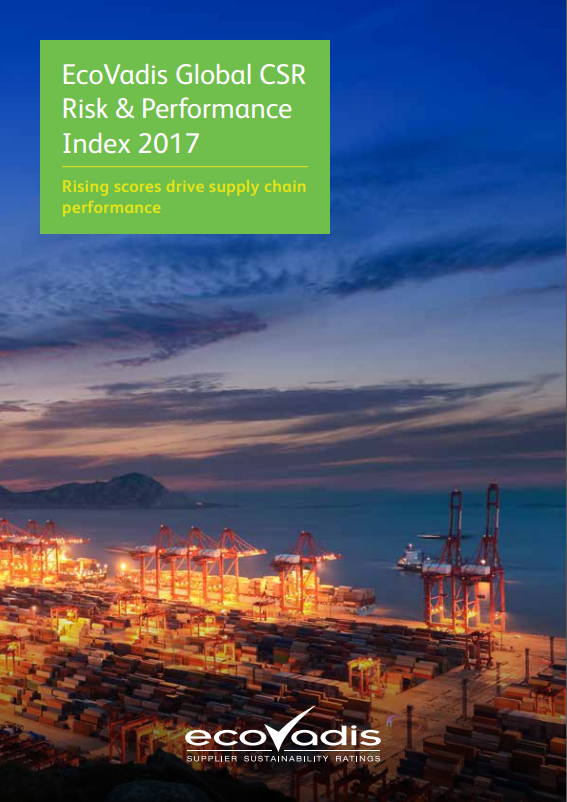Our Partner EcoVadis released last week their Global CSR Risk and Performance Index, a study on more than 20,000 companies. Read below their blog entry:
„The first annual Global CSR Risk and Performance Index reveals progress of more than 20,400 companies looking to improve their sustainability efforts.
Today we published our EcoVadis first annual edition of the Global CSR Risk and Performance Index – which represents the culmination of an intensive research project to track the corporate social responsibility (CSR) performance of more than 20,400 companies, based on EcoVadis CSR Ratings across 10 industries and three world regions.
The overall news is encouraging: As companies prioritize the benefits of sustainability – meeting customer demand, reducing risk, doing good for the world, increasing procurement ROI – they are investing more in supply chain sustainability and experiencing strong year over year improvements.
That said, the criticality of supply chain CSR remains extremely high, leaving a lot of room for all organizations and industries to grow and improve. We graded on a tough scale to represent that reality – overall progress was strong in 2016, but there’s still a major gap between where we are today and maximum CSR performance.
To determine Index scores, we measured and analyzed nearly 800,000 data points through 2015 and 2016. Companies were evaluated on 21 criteria across four themes, including: environment, labor practices and human rights, fair business ethics and sustainable procurement. We then broke suppliers down by industry and company size. Cumulative scores are based on a scale of zero to 100, with 25 representing basic CSR coverage, 50 representing standard, 75 comprehensive and 100 exceptional. We found a few interesting highlights, including:
- Environmental performance: The Large Manufacturing Advanced segment took the lead with a score of 51.6. The Food and Beverage industry topped the small and medium sized segment, with a score of 50.2.
- Labor practices and human rights: Small and Medium companies in the Construction Industry had the best score (50.3) whereas Large companies in the Finance, Legal, Consulting and Advertising Industry scored 47.3.
- Fair business ethics: The Finance, Legal, Consulting and Advertising Industry led all groups and sizes in the Fair Business Ethics segment with scores of 47.5 points for Large companies and 46.0 for Small and Medium companies.
- Sustainable procurement: SMB Food and Beverage companies earned the top sustainable procurement score (41.9). Manufacturing Light took the top spot in the Large category (41.4).
In looking at the performance of all participating companies, we found that, while the average score for both large and SMB were around 44, small and medium sized businesses are improving at a faster rate, in part due to recent initiatives that have focused on CSR issues in the value chain, like conflict minerals, environmental pollution and modern slavery. Because value chains are made mostly of small and medium sized companies, this improvement suggests a promising trend that will have a lasting effect on the global supply chain.
Geographically, we found a stark contrast in performance between Europe, the Americas and AMEA. The average score for large companies across all segments in Europe was 49, compared to 40.5 for the Americas and 38.3 for AMEA, which is improving at the fastest pace while the Americas remain relatively stagnant.
Our inaugural index also covers many trends across the global supply chain, including the circular economy in the supply chain, science-based targets to fight climate change, the relevance of cybersecurity for CSR and the nexus of corruption, human trafficking and modern slavery.
To learn more about the trends uncovered in this year’s research and the CSR performance results, please download the full EcoVadis CSR Risk and Performance Index.
Continue reading:
Sustainable procurement programs on the rise, still face challenges: EcoVadis Barometer results
Going Global – Driving Sustainability Initiatives Across Borders “










